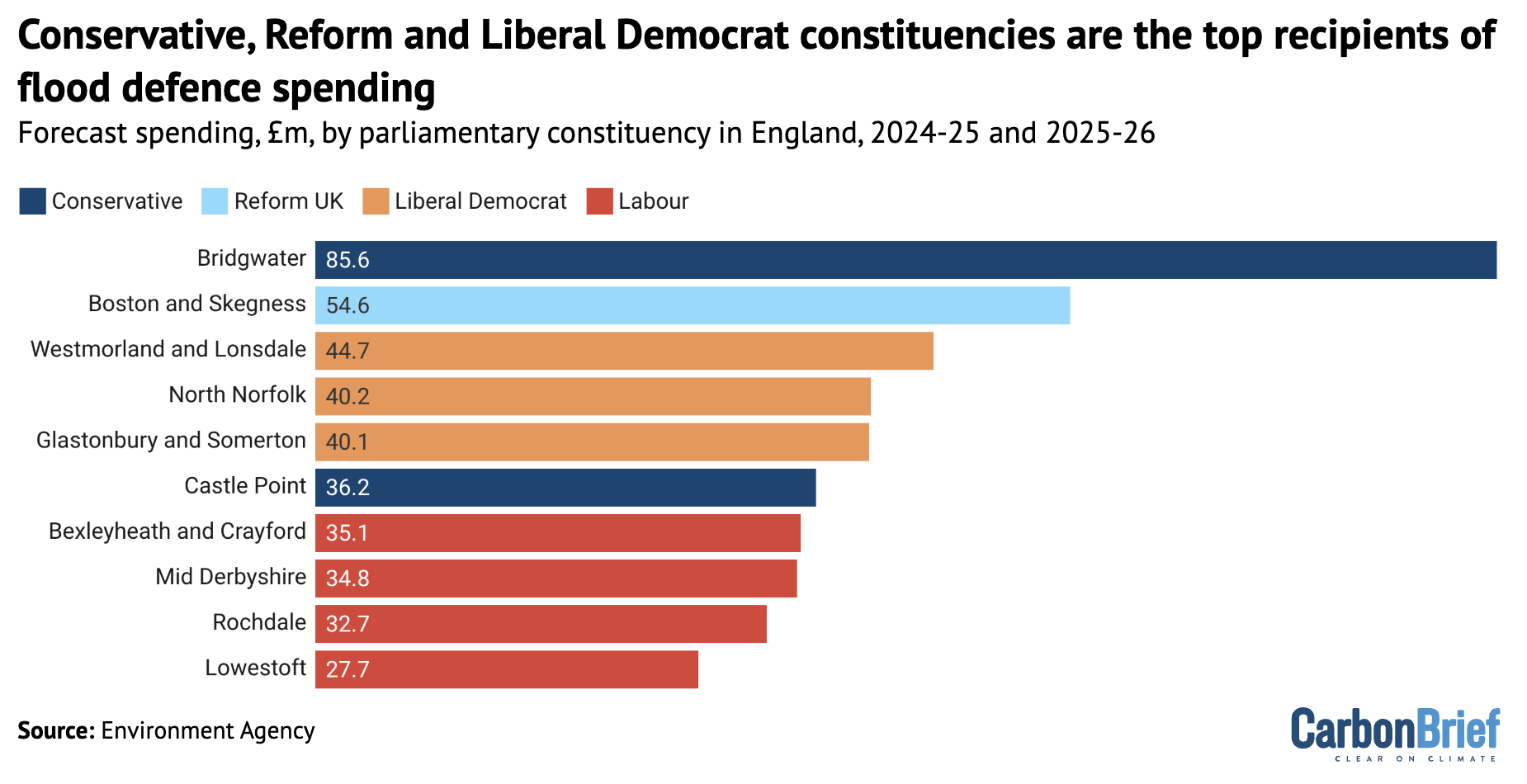We handpick and explain the most important stories at the intersection of climate, land, food and nature over the past fortnight.
This is an online version of Carbon Brief’s fortnightly Cropped email newsletter. Subscribe for free here.
Key developments
‘Tricks’ and ‘cover-ups’
LIVESTOCK EMISSIONS: Climate scientists speaking to the Financial Times accused the governments of New Zealand and Ireland of using an “accounting trick” to “cover up” methane emissions from their livestock sectors. An open letter from 26 climate scientists and covered by the newspaper said that New Zealand’s “proposed new methane targets risk setting a dangerous precedent”. The title added that scientists have separately raised concerns about Ireland’s approach.
POTENTIAL PROBLEMS: The controversy hinges on a way for measuring the impact of methane emissions on climate change, called “global warming potential star” (GWP*), the FT said. This method “estimates [methane’s] contribution to warming based on how emissions are changing relative to a baseline”. By contrast, the “long-established approach” used by most countries “compares the total warming impact of a given mass of methane to the same mass of [carbon dioxide] over a 100-year period”, the newspaper said.
‘MISAPPLICATION’: The scientists told the FT that some governments are “misapplying” GWP* to justify setting “no additional warming” targets, which allow methane emissions to remain flat rather than decline. The governments of Ireland and New Zealand did not respond to the newspaper’s requests for comment. But the newspaper added that “proponents” of the GWP* typically argue that it “better reflects methane’s short-lived nature in the atmosphere compared to the long-lasting effects of CO2”. One of the scientists behind the letter explained more of his thoughts in a LinkedIn post. A scientist not involved in the letter also posted a response.
SOMETHING FISHY: Elsewhere, an investigation by DeSmog and the Guardian has alleged that several UK supermarkets have sold seabass linked to “devastating overfishing” in Senegal. The two publications said that the retailers are accused of selling fish from Turkish farms that import large quantities of “fishmeal” – ground up fish used as feed – sourced from the African nation. Overfishing for fishmeal in Senegal is linked to “unemployment” and “food insecurity”, according to the Guardian. Responding to the claims, several of the supermarkets said they do not currently source from the implicated farms, but declined to say whether they had in the past.
Wild weather worldwide
EARLY MONSOON MAYHEM: An “unprecedented” early monsoon caught India’s farmers off guard, with “massive crop losses in states such as Tamil Nadu, Maharashtra, Telangana and Gujarat”, IndiaSpend reported. Climate scientists attributed the pre-monsoon thunderstorms to “unusual sea surface temperature patterns in the Pacific since 2023” and a higher frequency of “western disturbances” – extratropical storms originating over the Mediterranean. In the past week, north-eastern India has been battered by flash floods and landslides, with “at least 32 people killed and tens of thousands displaced”, the Independent reported. The newspaper noted that “studies show the monsoon in south Asia is getting worse due to the climate crisis”.
DELUGE AND DROUGHT: BBC News reported that more than 700 people are believed to be dead after “devastating” floods hit Nigeria, with the farming region of Mokwa witnessing “the worst [floods] in the area for 60 years”. Separately, Reuters reported that China’s south-western Yunnan province was hit by “flash floods and mudslides”, triggered by heavy rainfall. In unconnected reporting, Bloomberg said that China had stepped up cloud seeding to “bolster rainfall across parched wheat-growing areas” in the north, adding that the country had ramped up “weather modification” investments as “climate change heightens food security risks.”
CANADA BURNS: Canada’s prairie provinces continued to reel from “record-breaking” early-season wildfires, the Guardian reported. It pointed out that in Manitoba alone, wildfires have burned “about 200,000 hectares already this year” – three times “the recent full-year average”. Manitoba premier Wab Kinew said that simultaneous fires “in every region” were a “sign of a changing climate that we are going to have to adapt to”. The Guardian added that First Nations peoples in Saskatchewan – one of three recognised Indigenous peoples in Canada – “have been particularly affected, with some entire communities evacuated”.
Spotlight
UK’s former lead negotiator on UN nature talks
In this Spotlight, Carbon Brief speaks to the UK’s former lead UN negotiator about the successes and challenges of international nature talks.
Will Lockhart OBE represented the UK in UN nature negotiations from 2021 until the end of COP16 talks in Rome in February of this year.
In 2022, he helped to negotiate the Kunming-Montreal Global Biodiversity Framework (GBF), a landmark deal which has a headline “mission” to “halt and reverse” nature loss by 2030.
Following his departure from government, he spoke to Carbon Brief about his highs and lows, whether the world is making progress towards meeting its biodiversity goals and the role of UN summits – called COPs – in tackling environmental issues.
Carbon Brief: When you look back at your time heading up biodiversity negotiations, what are your highlights?
Will Lockhart: It’s all still emotionally raw. From a global perspective, the agreement of the GBF was a huge personal highlight. That was a really, really complicated negotiation. The notion that you could have frontpage news that was about an international agreement on nature, that was immensely exciting.
CB: In your view, is it possible to achieve the GBF’s mission to halt and reverse biodiversity loss by 2030?
WL: The trajectory right now would suggest, no, it’s looking incredibly hard to achieve. But, even then, with exactly the right interventions at exactly the right scale, it might still be possible. A fair question might be was it ever possible?…There has always been a contested evidence base about whether it could ever have been achieved.
The important thing is that people spent a lot of time thinking about why we were setting certain kinds of targets…We wanted them to be specific, measurable and achieveable. What does achievable mean? What does ambitious mean? What message are we trying to send? This is politics, this isn’t necessarily science.
If the answer is that it was never possible in the first place, then the question is: ‘Why did the world agree to it?’ And the answer to that is: ‘Because it matters that we try.’

CB: Could there be a better way for countries to address biodiversity loss than the current system?
WL: It’s a very complicated question. A question that everyone has to bear in mind is: ‘What [is the] value [of] the COPs?’ You pour a huge amount of time and resource into a global dialogue, which results in a very, very carefully negotiated outcome. It’s extremely important, in my view, that you have a space where the whole world can come together in a room and agree that it wants to do something. The question is, where does the world locate that process?
I worry that the world is simultaneously asking too much and too little of COPs. It’s asking too much in the sense that there’s so much coverage and intense scrutiny of ‘this person’s arrived’, ‘this comma has moved’…There’s an extraordinary media circus. [There is] extreme expectation on each individual meeting.
And, at the same time, it’s simultaneously asking too little of them. It’s like: ‘Great, this word was in so it was a good COP’ or ‘this word was out so it was a bad COP’. And of course COPs are just one tiny part of this huge global process that needs to happen if we’re going to tackle these problems. I rather worry – and I know that colleagues feel the same – they’re just viewed as ends in themselves.
This interview has been edited for clarity and length. A longer article has been published on Carbon Brief’s website.
News and views
RECORD FOREST LOSS: Tropical forest loss hit its highest level in a two-decade record in 2024 – double the level of 2023 – according to satellite data from Global Forest Watch covered by New Scientist. The report authors “attributed the surge in forest loss to the El Niño weather phenomenon and the warming global climate, which made the rainforest a tinderbox”, the magazine said. Climate Home News added that the rate of forest loss was the equivalent of losing 18 football pitches every minute.
RATIFY THIS: The EU ratified the UN “High Seas Treaty” last Wednesday, “joining a global effort to protect the ocean, curb environmental damage, tackle climate change and preserve biodiversity”, Jurist News reported. The EU’s ratification of the landmark treaty was joined by six of its member states: Cyprus, Finland, Hungary, Latvia, Portugal and Slovenia. The EU also pledged €40m as part of a Global Ocean Programme to support African, Caribbean and Pacific countries, according to an EU Commission press release.
THOUSAND CUTS: A “cornerstone” ecological research programme could potentially be culled by the Trump administration, the New York Times reported. Abolishing the Ecosystems Mission Area (EMA) “was an explicit goal of Project 2025, the blueprint for shrinking the federal government”, the story added. However, the budget cut “still needs to be approved by Congress”, with scientists rallying to save the EMA, the paper wrote. On Monday, the Trump administration announced plans to “eliminate federal protections across millions of acres of Alaskan wilderness” that could open the region to drilling and mining, according to another New York Times story.
NET NATURE LOSS?: In the UK, the Guardian reported that the “nature-friendly farming budget is set to be slashed” for “all but a few farms” in an upcoming spending review. Meanwhile, legal analysis of the Labour government’s new planning and infrastructure bill showed that “more than 5,000 of England’s most sensitive, rare and protected natural habitats are at high risk of being destroyed by development”, per another Guardian story. A key concern for green groups, it added, is a “cash for trash” clause that allows developers to “inflict adverse effects on the integrity of a protected site” if they pay into a fund to restore nature elsewhere.
MIRAGE CITY: Reuters reported on Egypt’s plans to build a new desert city, 42km west of Cairo, that could reroute “about 7% of [its] annual Nile River quota” from fertile delta land. According to the story, an estimated 10m cubic metres of Nile water will flow daily to Jirian city to “pass by upscale glass-fronted housing units and eventually” irrigate a 2.28m acre “New Delta” agricultural project. Jirian city will include luxury housing, a free economic zone and even a “yacht marina”, the newswire added, noting that the country is facing “mounting water shortages, power constraints and deepening economic crisis”.
FOREST-FRIENDLY BATTERIES: Electric car batteries made using iron and phosphorus “that pose less of a threat to forests” are “rapidly replacing batteries reliant on cobalt and nickel”, according to an International Energy Agency (IEA) report covered by Climate Home News. From 2020 to 2024, the market share of lithium nickel manganese cobalt batteries has risen from one-tenth to almost half, according to the IEA data. Both cobalt and nickel are “mainly mined in rainforest countries”, such as the Democratic Republic of the Congo and Indonesia, the publication added.
Watch, read, listen
REFORESTED SCHOOLS: Mongabay explored how “urban forests” in schools in Niger are helping to build “climate resilience and education”.
SO LONG, SALGADO: The New Yorker examined the visual legacy of photojournalist Sebastião Salgado, who died last week. Salgado’s Genesis series is celebrated as a “paean to natural landscapes and Indigenous ways of living”.
SECOND ACT: In an Atlantic long-read, writer Emma Marris looked at the debate calling for a law to protect ecosystems along with endangered species in the US.
PROUD, NATURALLY: CBC News reviewed Animal Pride, a new documentary about queer animal behaviour that filmmaker Connel Bradwell described as “nature’s coming-out story”.
New science
- Greater fish biodiversity can help improve nutrition and make fisheries more resilient, according to new research published in Nature Sustainability. The study found that fishing waters with complementary species could provide more than 60% in additional nutrients than a similar-sized catch of the most nutrient-rich species.
- A new study in Nature Climate Change found that “natural climate solutions” in croplands offer only “modest” mitigation benefits if reductions in crop yields are to be avoided. According to the authors, this indicates that “cropland soil will constitute a fraction of food system decarbonisation”.
- New research in Communications Earth and Environment found that global agricultural labour productivity could decrease by 18% by 2100 under a scenario of high heat-stress and labour sensitivity.
In the diary
- 2-6 June: 69th Meeting of the Global Environment Facility Council | Washington DC
- 5 June: World Environment Day
- 7 June: Ocean Rise and Coastal Resilience Summit | Nice, France
- 9-13 June: 2025 UN Ocean Conference | Nice, France
- 16-26 June: UN Framework Convention on Climate Change intersessional meetings | Bonn, Germany
Cropped is researched and written by Dr Giuliana Viglione, Aruna Chandrasekhar, Daisy Dunne, Orla Dwyer and Yanine Quiroz. Please send tips and feedback to cropped@carbonbrief.org
The post Cropped 4 June 2025: ‘Tricks’ and ‘cover-ups’; Wild weather; Former UN nature negotiator interviewed appeared first on Carbon Brief.
Cropped 4 June 2025: ‘Tricks’ and ‘cover-ups’; Wild weather; Former UN nature negotiator interviewed
Climate Change
Analysis: Constituency of Reform’s climate-sceptic Richard Tice gets £55m flood funding
The Lincolnshire constituency held by Richard Tice, the climate-sceptic deputy leader of the hard-right Reform party, has been pledged at least £55m in government funding for flood defences since 2024.
This investment in Boston and Skegness is the second-largest sum for a single constituency from a £1.4bn flood-defence fund for England, Carbon Brief analysis shows.
Flooding is becoming more likely and more extreme in the UK due to climate change.
Yet, for years, governments have failed to spend enough on flood defences to protect people, properties and infrastructure.
The £1.4bn fund is part of the current Labour government’s wider pledge to invest a “record” £7.9bn over a decade on protecting hundreds of thousands of homes and businesses from flooding.
As MP for one of England’s most flood-prone regions, Tice has called for more investment in flood defences, stating that “we cannot afford to ‘surrender the fens’ to the sea”.
He is also one of Reform’s most vocal opponents of climate action and what he calls “net stupid zero”. He denies the scientific consensus on climate change and has claimed, falsely and without evidence, that scientists are “lying”.
Flood defences
Last year, the government said it would invest £2.65bn on flood and coastal erosion risk management (FCERM) schemes in England between April 2024 and March 2026.
This money was intended to protect 66,500 properties from flooding. It is part of a decade-long Labour government plan to spend more than £7.9bn on flood defences.
There has been a consistent shortfall in maintaining England’s flood defences, with the Environment Agency expecting to protect fewer properties by 2027 than it had initially planned.
The Climate Change Committee (CCC) has attributed this to rising costs, backlogs from previous governments and a lack of capacity. It also points to the strain from “more frequent and severe” weather events, such as storms in recent years that have been amplified by climate change.
However, the CCC also said last year that, if the 2024-26 spending programme is delivered, it would be “slightly closer to the track” of the Environment Agency targets out to 2027.
The government has released constituency-level data on which schemes in England it plans to fund, covering £1.4bn of the 2024-26 investment. The other half of the FCERM spending covers additional measures, from repairing existing defences to advising local authorities.
The map below shows the distribution of spending on FCERM schemes in England over the past two years, highlighting the constituency of Richard Tice.
By far the largest sum of money – £85.6m in total – has been committed to a tidal barrier and various other defences in the Somerset constituency of Bridgwater, the seat of Conservative MP Ashley Fox.
Over the first months of 2026, the south-west region has faced significant flooding and Fox has called for more support from the government, citing “climate patterns shifting and rainfall intensifying”.
He has also backed his party’s position that “the 2050 net-zero target is impossible” and called for more fossil-fuel extraction in the North Sea.
Tice’s east-coast constituency of Boston and Skegness, which is highly vulnerable to flooding from both rivers and the sea, is set to receive £55m. Among the supported projects are beach defences from Saltfleet to Gibraltar Point and upgrades to pumping stations.
Overall, Boston and Skegness has the second-largest portion of flood-defence funding, as the chart below shows. Constituencies with Conservative and Liberal Democrat MPs occupied the other top positions.

Overall, despite Labour MPs occupying 347 out of England’s 543 constituencies – nearly two-thirds of the total – more than half of the flood-defence funding was distributed to constituencies with non-Labour MPs. This reflects the flood risk in coastal and rural areas that are not traditional Labour strongholds.
Reform funding
While Reform has just eight MPs, representing 1% of the population, its constituencies have been assigned 4% of the flood-defence funding for England.
Nearly all of this money was for Tice’s constituency, although party leader Nigel Farage’s coastal Clacton seat in Kent received £2m.
Reform UK is committed to “scrapping net-zero” and its leadership has expressed firmly climate-sceptic views.
Much has been made of the disconnect between the party’s climate policies and the threat climate change poses to its voters. Various analyses have shown the flood risk in Reform-dominated areas, particularly Lincolnshire.
Tice has rejected climate science, advocated for fossil-fuel production and criticised Environment Agency flood-defence activities. Yet, he has also called for more investment in flood defences, stating that “we cannot afford to ‘surrender the fens’ to the sea”.
This may reflect Tice’s broader approach to climate change. In a 2024 interview with LBC, he said:
“Where you’ve got concerns about sea level defences and sea level rise, guess what? A bit of steel, a bit of cement, some aggregate…and you build some concrete sea level defences. That’s how you deal with rising sea levels.”
While climate adaptation is viewed as vital in a warming world, there are limits on how much societies can adapt and adaptation costs will continue to increase as emissions rise.
The post Analysis: Constituency of Reform’s climate-sceptic Richard Tice gets £55m flood funding appeared first on Carbon Brief.
Analysis: Constituency of Reform’s climate-sceptic Richard Tice gets £55m flood funding
Climate Change
US Government Is Accelerating Coral Reef Collapse, Scientists Warn
Proposed Endangered Species Act rollbacks and military expansions are leaving the Pacific’s most diverse coral reefs legally defenseless.
Ritidian Point, at the northern tip of Guam, is home to an ancient limestone forest with panoramic vistas of warm Pacific waters. Stand here in early spring and you might just be lucky enough to witness a breaching humpback whale as they migrate past. But listen and you’ll be struck by the cacophony of the island’s live-fire testing range.
US Government Is Accelerating Coral Reef Collapse, Scientists Warn
Climate Change
Satellites Reveal New Climate Threat to Emperor Penguins
Ice loss in the Antarctic Ocean may be killing the sea birds during their molting season.
Each year for millennia, emperor penguins have molted on coastal sea ice that remained stable until late summer—a haven during a span of several weeks when it’s dangerous for the mostly aquatic birds to enter the ocean to feed because they are regrowing their waterproof feathers.
-
Greenhouse Gases7 months ago
Guest post: Why China is still building new coal – and when it might stop
-
Climate Change7 months ago
Guest post: Why China is still building new coal – and when it might stop
-

 Greenhouse Gases2 years ago
Greenhouse Gases2 years ago嘉宾来稿:满足中国增长的用电需求 光伏加储能“比新建煤电更实惠”
-
Climate Change2 years ago
Bill Discounting Climate Change in Florida’s Energy Policy Awaits DeSantis’ Approval
-
Climate Change2 years ago
Spanish-language misinformation on renewable energy spreads online, report shows
-

 Climate Change2 years ago
Climate Change2 years ago嘉宾来稿:满足中国增长的用电需求 光伏加储能“比新建煤电更实惠”
-
Climate Change Videos2 years ago
The toxic gas flares fuelling Nigeria’s climate change – BBC News
-

 Carbon Footprint2 years ago
Carbon Footprint2 years agoUS SEC’s Climate Disclosure Rules Spur Renewed Interest in Carbon Credits









